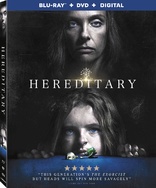Hereditary Blu-ray Movie
HomeHereditary Blu-ray Movie 
Blu-ray + DVD + Digital CopyLionsgate Films | 2018 | 127 min | Rated R | Sep 04, 2018
Movie rating
7.9 | / 10 |
Blu-ray rating
| Users | 0.0 | |
| Reviewer | 3.5 | |
| Overall | 3.5 |
Overview
Hereditary (2018)
When a matriarch of the Graham family, passes away, her daughter's family begins to unravel cryptic and increasingly terrifying secrets about their ancestry.
Starring: Toni Collette, Alex Wolff, Milly Shapiro, Mallory Bechtel, Ann DowdDirector: Ari Aster
| Horror | 100% |
| Mystery | 34% |
| Supernatural | 29% |
| Psychological thriller | 28% |
| Drama | 5% |
Specifications
Video
Video codec: MPEG-4 AVC
Video resolution: 1080p
Aspect ratio: 2.00:1
Original aspect ratio: 2.00:1
Audio
English: DTS-HD Master Audio 5.1 (48kHz, 24-bit)
Subtitles
English SDH, Spanish
Discs
Blu-ray Disc
Two-disc set (1 BD, 1 DVD)
Digital copy
DVD copy
Packaging
Slipcover in original pressing
Playback
Region A (locked)
Review
Rating summary
| Movie | 3.5 | |
| Video | 4.5 | |
| Audio | 4.5 | |
| Extras | 1.5 | |
| Overall | 3.5 |
Hereditary Blu-ray Movie Review
Will you want to possess this Blu-ray?
Reviewed by Jeffrey Kauffman September 3, 2018Hereditary's closing credits mention that it was shot in Utah, and according to online data at such sites as IMDb (and others), that locale is
further specified as being in and around Salt Lake City. Though it's really not germane to the story the film tells, the Utah location perhaps
"perked up" my personal ears for a couple of reasons. Having been born and raised in Salt Lake City, and probably
due to the fact that I was a non-LDS being reared in a culture that was decidedly very Mormon back in those days (I've heard from
friends, including LDS friends, that it's considerably more ecumenical slash cosmopolitan nowadays), I found it kind of funny
that a film about cults and demonic possession should have been filmed in a region renowned for hosting a religion that is both perceived as being
vice free (in terms of supposed "sins" like smoking and/or drinking, not to mention devil worship), but that I've nonetheless actually heard other
people claim is a cult itself (I'm not condoning such an analysis, merely reporting it). Kind of weirdly, I just stumbled upon this kind of fascinating tidbit from the Salt Lake area’s relatively recent past, which would
suggest that despite its often squeaky clean image, there’s a roiling substratum of supposedly “nefarious” activity that has occurred in or near the
valley
that Brigham Young famously described as “the place” his pilgrims had been searching for in their trek across the American wilderness, a place
that
evidently has included all kinds of "cults" over the years.
There was
a funny old Johnny Carson joke from long ago where he described flying into the Salt Lake airport and the stewardess announcing, “We’re about to
arrive in Salt Lake City, please set your watches back twenty years,” but Hereditary may subliminally suggest that there’s a somewhat
“longer” timeline suffusing the region, one that reaches back into the dim mists of creation when certain angels decided they knew best and all hell
literally broke loose. Hereditary is an unabashedly disturbing film, and while it ultimately gets to some rather grotesque depictions (more
about which a bit later in this review), it’s interesting to contrast this film’s approach with another outing I just reviewed, the Stephen Biro opus The Song of Solomon. The Song of
Solomon is another film about
possession which (as I mentioned in our The Song of
Solomon Blu-ray review) proffers a pull quote on its cover touting it as “better than The Exorcist” (as can be seen in the key art above this review, the Friedkin film is also cited in a pull quote on this
release as well). The Song of Solomon makes no cinematic bones about the presence of evil taking over the
mind, soul and body of a young woman named Mary, and the bulk of that film deals with increasingly gory aspects of both possession and
exorcism, with the film beginning with an extremely graphic sequence documenting the suicide of Mary's father courtesy of a knife he wields.
Hereditary on the other hand manages to develop an unabashedly spooky mood more out of hints than outright displays for at least the
first half hour or so, as it documents the emotional roller coaster an artist named Annie Graham (an impressive Toni Collette) experiences
after first the death of her perhaps mentally ill mother and then somewhat later another tragic demise that tips Annie and her family into a fraught
dynamic where the “veil” between reality and perhaps imagined fears is, to purloin a phrase also from long ago, rent asunder.

Note: At least one salient plot point needs to be discussed in any attempt to talk about Hereditary, a plot point which probably verges on spoiler territory, despite the fact that many if not most writings I've personally read about the film mentions it without any warning. I'll do the kind thing, and offer those wanting a revelation free (so to speak) first viewing experience the chance to skip down to the technical portions of the review, below, in order to avoid any unwanted disclosures.
Kind of interestingly, Hereditary starts with some printed text offering the obituary of Annie’s mother, before moving on to Annie’s family preparing to go to the funeral. Annie delivers a kind of halting eulogy, where she admits she was estranged from her mother, and that her mother was extremely secretive for most of her life. Already there are hints of dysfunctional shadows in these opening moments, with a kind of emotional disconnect between Annie and her husband Steve (Gabriel Byrne), son Peter (Alex Wolff) and daughter Charlie (Milly Shapiro). Charlie seems especially unusual, prone toward tics and weird clicking sounds she makes with her tongue, and also highly invested in her little sketchbook she carries with her everywhere, to which she adds some rather bizarre illustrations even during the service in remembrance of her grandmother. This particular sequence ends with a kind of ham handed foreshadowing when Charlie is seen eating a chocolate bar and her parents question her as to whether it contains nuts.
A number of kind of outré elements accrue around the basic unsettling feeling the film offers, including the fact that Annie is evidently a famous “miniature” artist, crafting little cities in her workshop which have apparently made her something of a celebrity. This particular plot point is interesting, if not exactly explicatory of anything. One might think that Annie’s “recreations” are an attempt to maintain control in some kind of environment, especially as things spiral toward chaos in her real life, but it’s salient to note she actually spends quite a bit of time revisiting in miniature form a central tragedy the film presents, which may suggest a more mundane perspective that her artwork is simply therapy for her increasingly rattled state.
While there are some spooky moments early on where Annie is convinced she’s seen her mother’s spirit (something the film offers to the viewer as well, making any ambiguity kind of a dicey prospect), as well as a box full of memorabilia her mother left her, things really kick into true horror mode a bit after the half hour mark, when Annie insists that Charlie accompany Peter to a party the boy is going to. As he’s in a bedroom getting stoned, Charlie munches on food that obviously contains nuts, leading to her going into anaphylactic shock. In a panic, Charlie zooms off with her on a foggy rural road to try to get to the nearest hospital. In a sequence which is initially played rather discursively, and is all the more devastating as a result, Charlie, trying desperately to get air, sticks her head out of the back window just at the moment Peter needs to swerve to avoid a dead animal in the road. A shoulder hugging telephone or power pole is seen hurtling toward Charlie’s head, and the viewer is left to visualize what has happened.
In another rather fascinating bit of presentational style, Peter, obviously in shock, simply drives home and crawls into bed. The camera stays fixed on him as the next day dawns and Annie goes to the car to drive to an errand. Her out of frame screams ably document what horrors she found in the back seat of the car, at which point Hereditary offers its first real scene of carnage (after a brief earlier vignette showing Charlie cutting the head off of a dead bird, something that the camera doesn’t really dwell on), an “up close and personal” look at Charlie’s decapitated head lying on the pavement and covered with flies. Whether this is “real” or simply Peter’s imagination isn’t really made clear, but the end result is the same — it’s easily one of the most disturbing moments the film offers.
Annie is obviously incredibly distraught over this development, and she makes a halting attempt to return to a grief support group she had visited earlier after her mom’s death. She’s approached by a woman named Joan (Ann Dowd), who attempts to offer a shoulder for Annie to cry on. The two develop a relationship built around the devastating loss of a child (or grandchild, in Joan’s case), but, later, Joan kind of conspiratorially tells Annie that she’s gone to a seance and has contacted her dead grandchild. Joan gives Annie instructions on how to do the same ritual in order to contact Charlie.
All of this plays out with the family dynamics unraveling in the wake of Charlie’s horrifying death, something that Peter obviously feels responsible for, and which Annie, in an emotionally overwrought family dinner, more or less blames him outright for. Peter is also experiencing paranormal phenomena like seeing Charlie’s apparition and repeatedly hearing her tongue clicking. Meanwhile, Annie becomes convinced she’s opened some kind of portal to nether regions with her incantations to start the seance, a fear which is increased with the one two punch of Joan suddenly disappearing, and then the frightening discovery Annie makes in her mother’s scrapbook that Joan had a long history with her family and may not have just been an “innocent” fellow griever at the support group.
Hereditary is really strong on mood, but I’m not quite sure the film’s internal logic really holds up to any serious inquiry. There are hints that Annie’s family was “chosen” long ago by the cult at the center of the film, but even this element isn’t explained properly or developed in any real way. That tends to make the proceedings play a bit more like Rosemary's Baby, with a befuddled heroine finding herself enmeshed in a conspiracy that has ensnared her in an almost random fashion. The film’s continued emphasis on headless beings is also kind of odd and I personally was never quite sure what writer-director Ari Aster was aiming for with this particular aspect. And why exactly is the family tree house such a “shrine”? All of this said, Hereditary is undeniably unsettling, anchored by a fully committed performance by Collette, who brings all of Annie’s neurotic tendencies fully alive, something that arguably might have been played up even more to arrive at a spot where the viewer might not be quite sure as to whether what is being depicted is actually happening, or simply a delusion of Annie’s addled mind. Hereditary is therefore almost too literal for its own good at times.
Note: My colleague Brian Orndorf was somewhat less impressed with Hereditary than I was. You can read Brian's thoughts here.
Hereditary Blu-ray Movie, Video Quality 
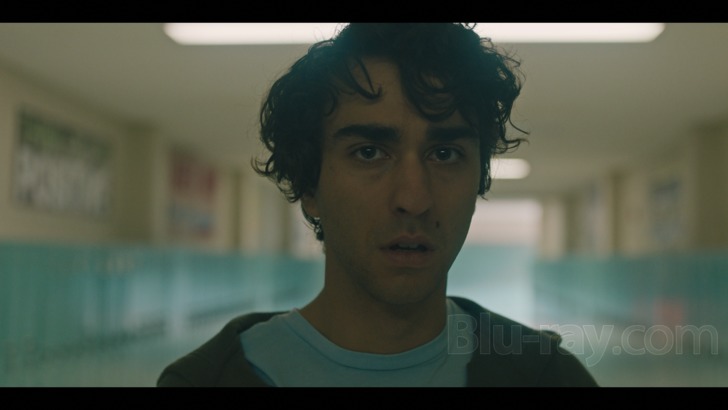
Hereditary is presented on Blu-ray courtesy of Lionsgate Films with an AVC encoded 1080p transfer in 2.00:1. The IMDb lists a variety of Arri models as having digitally captured the imagery, which was then finished at a 2K DI. The film is perhaps unavoidably highly stylized, with a number of interior shots bathed in a kind of brownish-yellow hue, and with other, near hallucinatory, moments similarly swathed in cooler blue tones. Aster and cinematographer Pawel Pogorzelski utilize a lot of extreme close-ups, something that helps maintain very good to excellent levels of fine detail despite the at times rather aggressive grading choices. Those grading choices probably only make the more natural looking moments pop all the more vividly, and a few selected outdoor scenes offer a warmly suffused palette that features nice depth of field while also supporting commendable general detail levels. There are a couple of moments of very slight banding in evidence (the most notable one for me was the harrowing scene with Peter and Charlie in the car, where headlights aimed directly at the camera in a supposedly foggy environment show clear gradation lines), but otherwise this is solid looking transfer that should please the film's fans.
Hereditary Blu-ray Movie, Audio Quality 
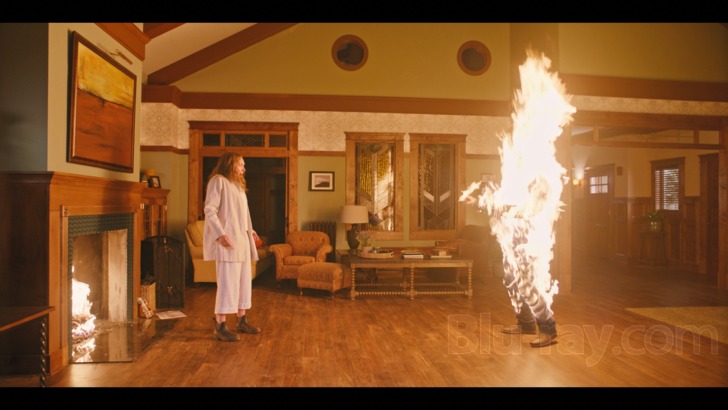
Hereditary features an ominous sounding DTS-HD Master Audio 5.1 that traffics in some fairly hoary sound design clichés, but which still delivers some admirable atmosphere. The film's moody score is often mixed with washes of low frequency sound, both of which waft through the surround channels in an almost menacing fashion, and which together add a bit of unease to seemingly "innocent" scenes like some views of Annie's miniature work. The "haunting" scenes provide little jolts of sonic energy in discrete channels, but a lot of Hereditary is fairly tamped down, sound design wise, with an emphasis on front and center dialogue. All elements are delivered with excellent fidelity and no problems whatsoever.
Hereditary Blu-ray Movie, Special Features and Extras 
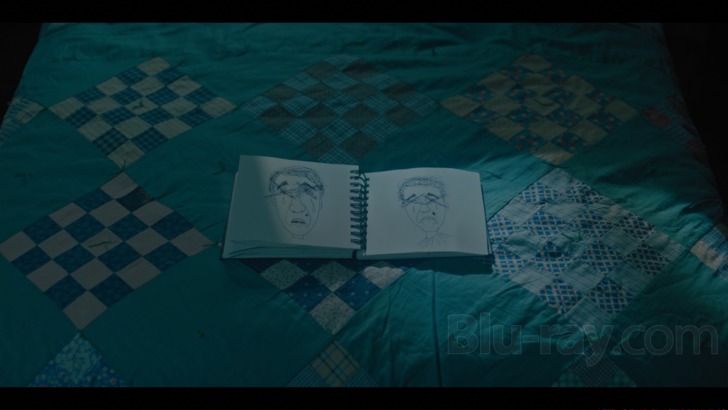
- Cursed: The True Nature of Hereditary (1080p; 20:08) is an above average EPK with writer-director Ari Aster and others speaking about the film's emphasis on family trauma rather than the supernatural and/or occult aspects.
- Selected Deleted Scenes (1080p; 15:46)
- Evil in Miniature: Photo Gallery (1080p)
Hereditary Blu-ray Movie, Overall Score and Recommendation 
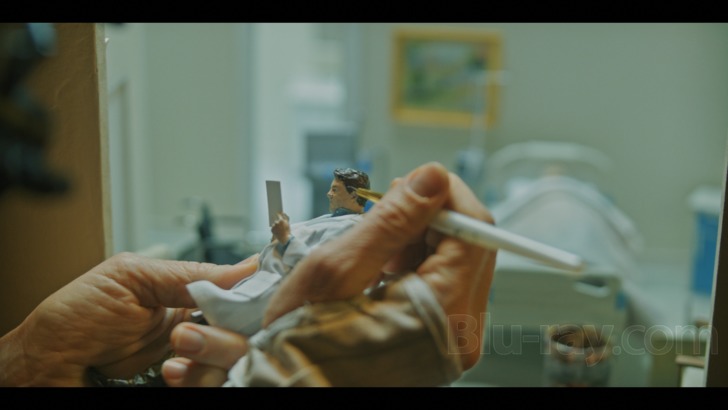
I'm not completely sure Hereditary is quite the modern classic some others seem to have felt it is, but the film has an undeniably effective mood which helps it elide some of its lack of development and in fact logic. Collette is excellent in a role that might have devolved into needless histrionics with a less nuanced performer, and the supporting cast, notably Wolff as son Peter, is also excellent. Technical merits are solid, and Hereditary comes Recommended.
Similar titles
Similar titles you might also like

Midsommar
2019

The Haunting of Hill House
Extended Director's Cut
2018

Oculus
2013

The Shining 4K
1980

The Babadook
2014

Session 9
2001

Proxy
2013

The Witch 4K
2015

Antichrist
2009

Doctor Sleep
Includes Director's Cut
2019

The Haunting
1963

The Others 4K
2001

The Little Stranger
2018

Shut In
2016

The Disappointments Room
2015

The Turning
2020

The Lodge
2019

Unsane
2018

Let's Scare Jessica to Death
1971

Smile
2022
